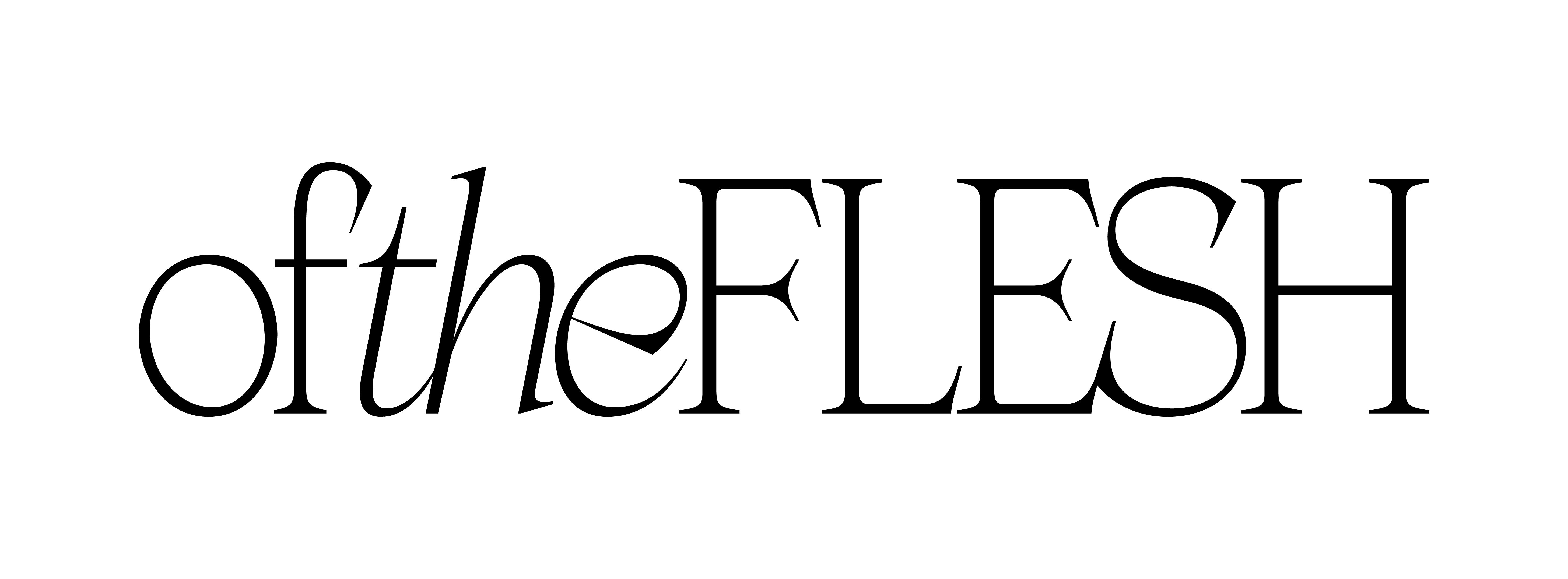Inspired by the depths of raw emotion, self-identity, and the vulnerable energy found in transcendent human connections that bind pain and pleasure, Mark Dektor is a Los Angeles-based photographer who believes true beauty comes from within. Playing on the juxtaposition of black and white, Dektor documents some of the most intimate stories, portraits, and unspoken dialogue of various individuals within both the queer and BDSM communities.
You have a real talent for connecting with individuals and truly portraying their persona, their authenticity, their deepest inner selves. What sparked your passion for photography?
Getting down to people’s core, seeing who they really are, and capturing their essence. That’s what makes me do what I do. What got me into photography was the initial advertising I was doing with the Dove campaign. It was non-actors talking about beauty, and the entire concept behind that campaign was that beauty comes from within.
I shot a lot of people that didn’t really fall into the conventional category of the standard beauty that society kind of dictates. It was something I even subscribed to and I really wanted to change that.
When I saw that in this community—people who were so body-positive, but still knowing that some deal with things like body dysmorphia—it felt like I could use my voice to change that.
Your art is bold and often times, emotional—exposing intimate moments of unique individuals. Talk to me about what influenced you to expand your work and explore new territories, including both the kink and LGBTQ communities?
I really wanted out of advertising and honestly, I never thought I would be doing this. I was just trying to be a portrait photographer because I like to connect with people. I shot a bunch of portraits and was trying to get more people to allow me to shoot them, aside from friends and family. I was trying to build a portfolio. At the time, my cousin was working on a documentary and he had shot with Nina Hartley and asked if I wanted to shoot with her. I ended up shooting her as a Domme and then a lightbulb sort of went off. I remember thinking, wow, this is really cool, and at that point, I was just going to shoot other Dommes.
I reached out to Snow Mercy on Model Mayhem and then I sent a message to the Domme Collective. I photographed a lot of different women and was starting to establish myself within the community. Then I met Bettie [Bondage] and when I met her, I was opened up to the entire LGBTQ community. I owe a lot to her because she introduced me to so many people. When I started to network and shoot more, I remember seeing an image I captured of aftercare and another lightbulb went off. It became more than just portraits of people. I started to shoot scenes and learn more about what BDSM was and here I am now. Another reason I pushed my photography towards the queer community was because of the acceptance I was getting. It made me so passionate and it’s why I also shoot queer men. It’s not just BDSM anymore. It’s centered around the community as a whole.
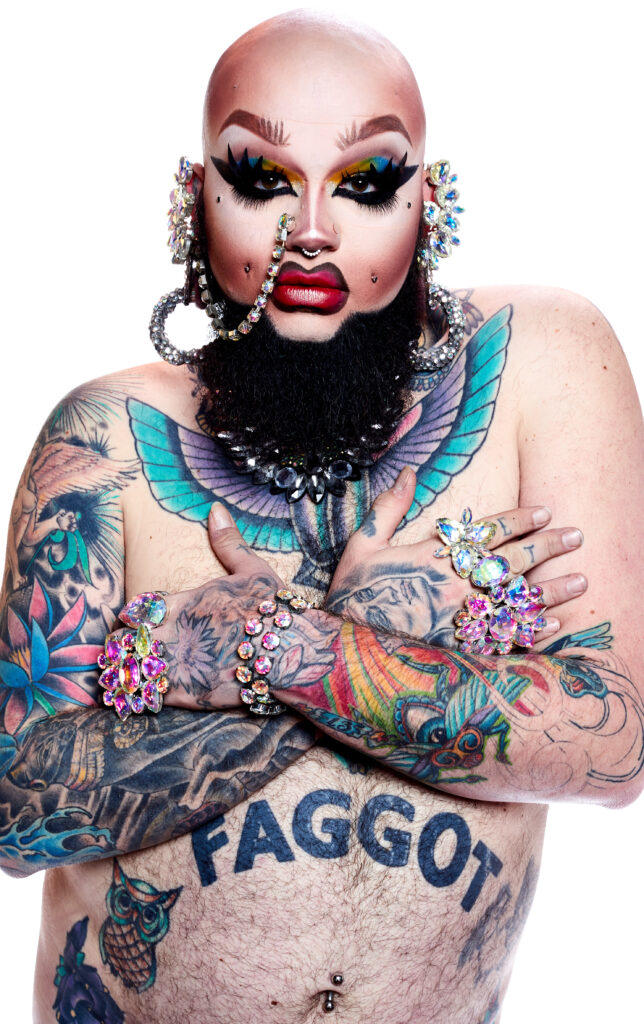
Do you recall your initial experience shooting a scene?
One of the first scenes I shot was impact play. I remember the top was kind of laughing and smiling and I didn’t know that it was part of the play. I thought it was just her being nervous in front of the camera. And the thing is, I didn’t really know how to shoot a scene. It took me about two years to figure that out, you know? I didn’t know what the moments were or how to capture them. I didn’t understand yet.
Have you explored your sexuality within the BDSM world, and if not, do you find that shooting kink has enabled you to become more curious about it?
I’m trying to think if I want to answer that question. I will just leave that as a yes. And there is more to that, which I can share with you outside of this, but I can’t share that for this interview.
You have photographed incredibly heavy scenes, including impact, edge play, and suspension. Having shot a few of those scenes with you, I see the look on your face. It’s almost like you are experiencing the same emotions and sensations as those you are capturing. How do you prepare yourself mentally before each shoot?
I have had photographer drop. It’s a real thing.Every scene is with people I know. I don’t shoot with just anyone, but I have my boundaries too, you know? Everyone has their boundaries.
I just want to make sure everyone is safe. I think I want to the same thing the bottom wants from their top because I’m investing myself emotionally into each scene as well. I shot a really heavy scene with Bella [Bathory] and she posted something on her Instagram that said, “top drop, sub drop, photographer drop”—something like that—and it was legit. I didn’t realize what that meant until she said it and it’s crazy.
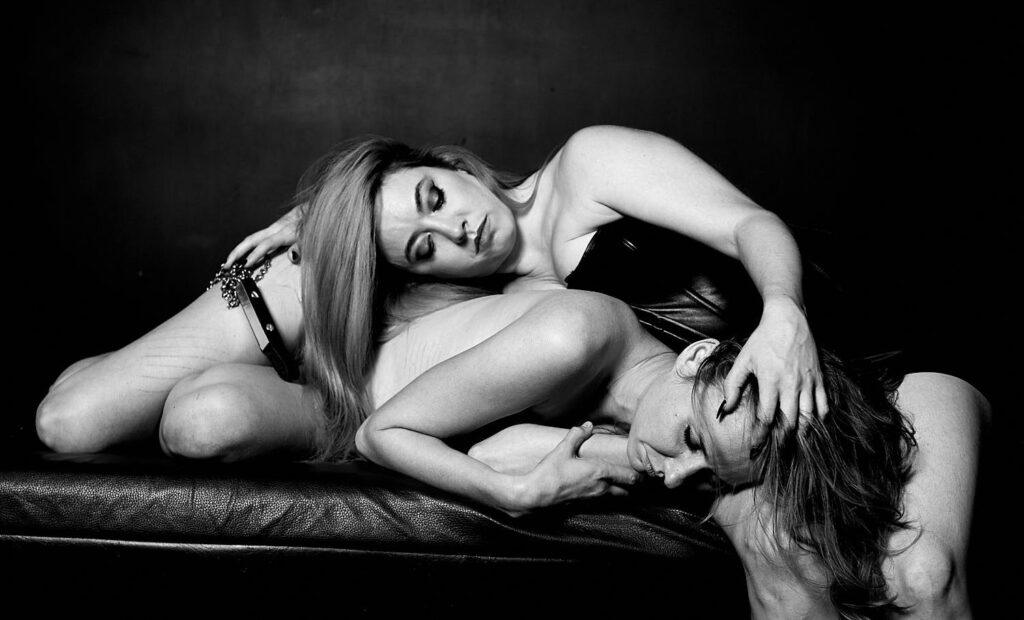
Talk to me more about photographer drop. What does that look like for you?
It’s funny because I remember asking you that before, about sub drop. It’s like a high, an adrenaline, sort of feeling a different way in your body. Then there’s the coming down from that, almost like an anticipation and then the experience. And it’s really bizarre to be in a position to feel like that because I’m just the photographer. Nothing is happening to me.
Yes, but these scenes are so intimate and there’s a different kind of energy in the studio with each subject you shoot. Everyone feels it, especially when you are an empath. We feel that energy more intensely.
I do, and people have asked me—people who have seen my work outside of this community—if they can watch. But I always tell them no because it’s far too intimate and there’s a trust earned there.
Exactly. So, when you do experience photographer drop, what measures do you take to rejuvenate your mind and body? How do you practice self-care?
I like to check in with the people I shoot and that helps me a lot. I like to check in, but also when I review and edit the images I sort of relive the experience.
I want people to look at the pictures and feel emotion. I don’t want them to simply look at a shocking picture. I like to look at them as an arc, a beginning, a middle, and an end. And if you look at the three pieces together, you can see the progression of the scene and why it’s as beautiful as it is.
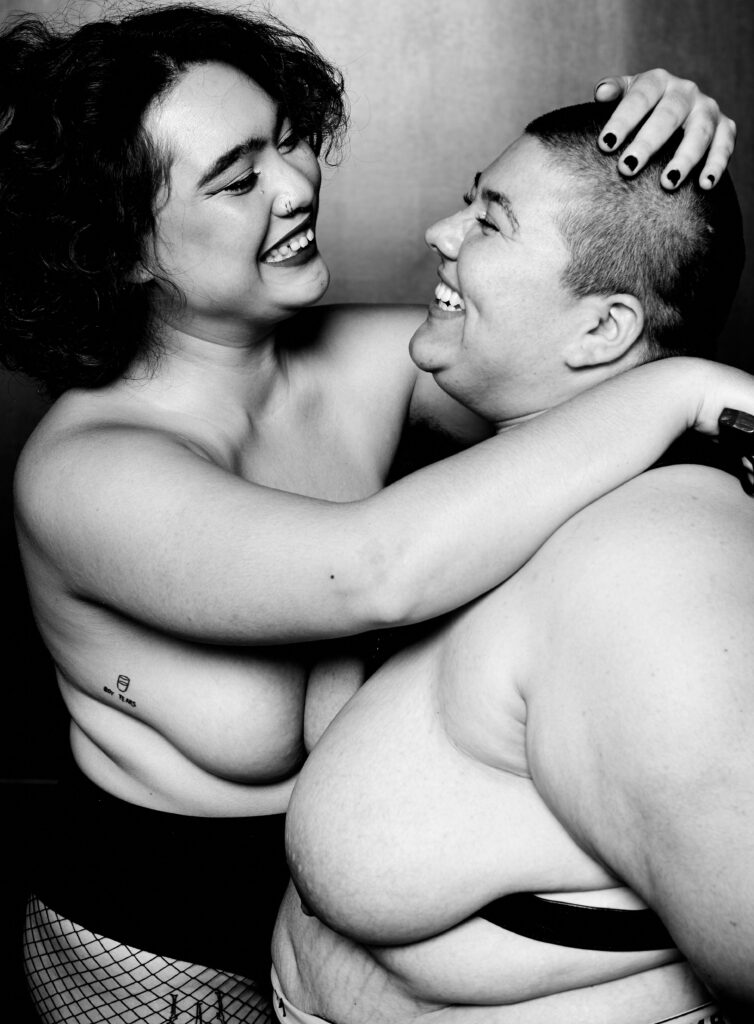
I want to transition the conversation and move towards a more challenging subject: body dysmorphia. You have been one of the few people in my life that I have been able to connect with about this subject because we both battle with the same disorder. How would you define body dysmorphia to those who are unfamiliar?
That’s a really good question. I describe it as never being satisfied with the way that I look. No matter how lean I get, how fit I get, I am never really satisfied. You can’t really describe this to people who don’t understand. You can try, but most people don’t get it. The other part of it is that you can’t tell someone not to feel a certain way. I will use you for example. When you feel a certain way, I look at you and ask myself how you can feel that, why do you think that? But saying that to someone means nothing because people will always feel the way they feel, especially with body dysmorphia. I can’t explain this any other way to people who don’t know what it feels like. It’s a really personal thing you go through and someone trying to console you about it or trying to make you feel a different way, might as well not say anything at all.
Tell me about your initial experience with the disorder. What have been some of your most recurrent thoughts or fears that you cannot control in terms of your body and overall image?
Everything, really. I mean, once you start to feel shitty, you get deeper into that. It affects me in so many ways. I was just in a really horrible place. I only just started to sort myself out. I procrastinated it until almost a month ago. I had three months of not trying to turn myself around because it was too hard. I have struggled with this my entire life. In the beginning it was, oh, he looks like a girl, because I had longer hair. I was heavier when I was younger and you know, you’re judged for that. You really are. Even now, someone who is in better shape will have a better chance at getting the job than someone who isn’t. It’s everywhere in society.
In this community, I recently shot someone who was heavier—a beautiful person—and she was turned down by a photographer because of her body image. And that really feeds into someone’s body dysmorphia. I don’t know if part of this is because photographers who shoot nude want to look at a specific body type, but it’s sad. What I know is that doing what I do is all about confidence and I don’t think I could do it if I wasn’t feeling confident. I have to have a certain energy while shooting and if my energy is bad or I am depressed, it translates into the studio.
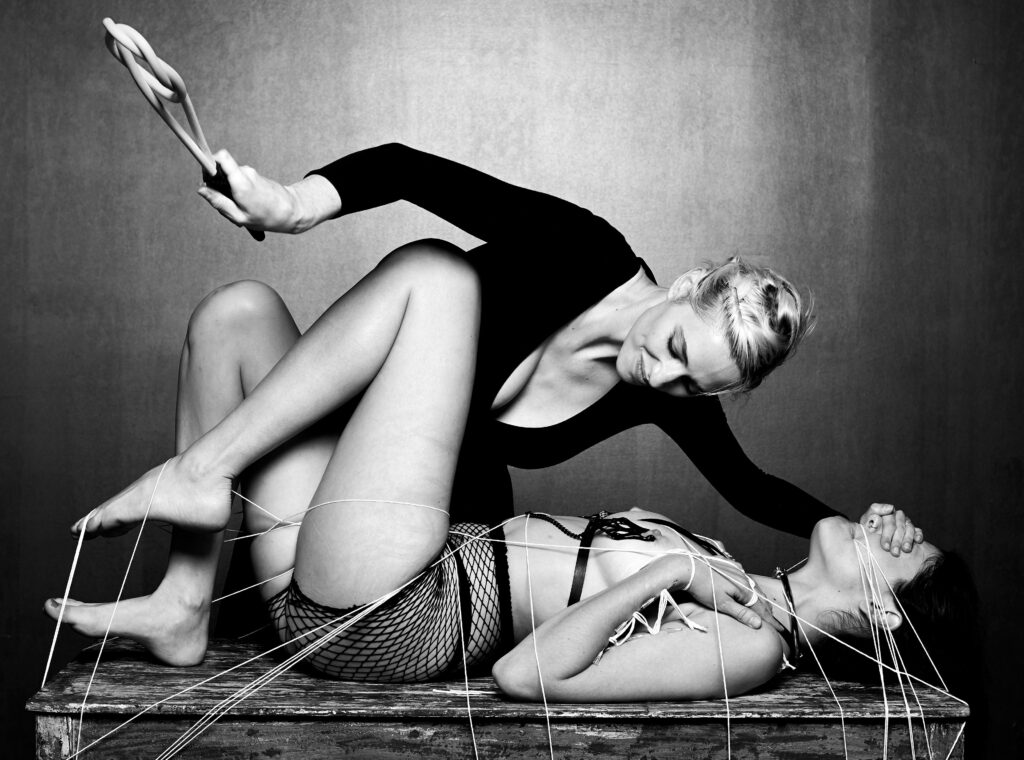
Some individuals who suffer from this disorder take drastic measures to hide their perceived flaws. In one of our personal conversations you mentioned that tattoos have actually helped you love parts of your body. Can you speak more on this?
I didn’t get tattoos for vanity reasons and I never in a million years would have thought I would have my full body tattooed. But it made me start to like the way I looked so I kept going. It just made me feel way better about myself. Maybe it’s because I am covering parts of my skin. It’s like a shield, I suppose. I mean, I love the art and I love the tattoo culture, but what got me into this was the body dysmorphia. Now, it’s just a huge part of my life and I’ll probably never stop. I have intimate relationships with my artists. I gave my whole body to it.
You photograph a variety of personalities, body types, genders, and sexualities. Do you find that photographing and seeing the beauty in so many diverse humans has had a positive effect on your body dysmorphia or perhaps has allowed you to accept yourself more?
It has, but within this community. Outside of this community there is still a certain perception of people, which is why I shoot people who say other photographers won’t shoot them. It’s important to show everyone and I feel that my work show’s people’s true beauty and confidence.
It may not be for everyone, but I want to show that beauty comes from within. There should never be expectations of people in regard to their weight or overall body image and I am very passionate about that.
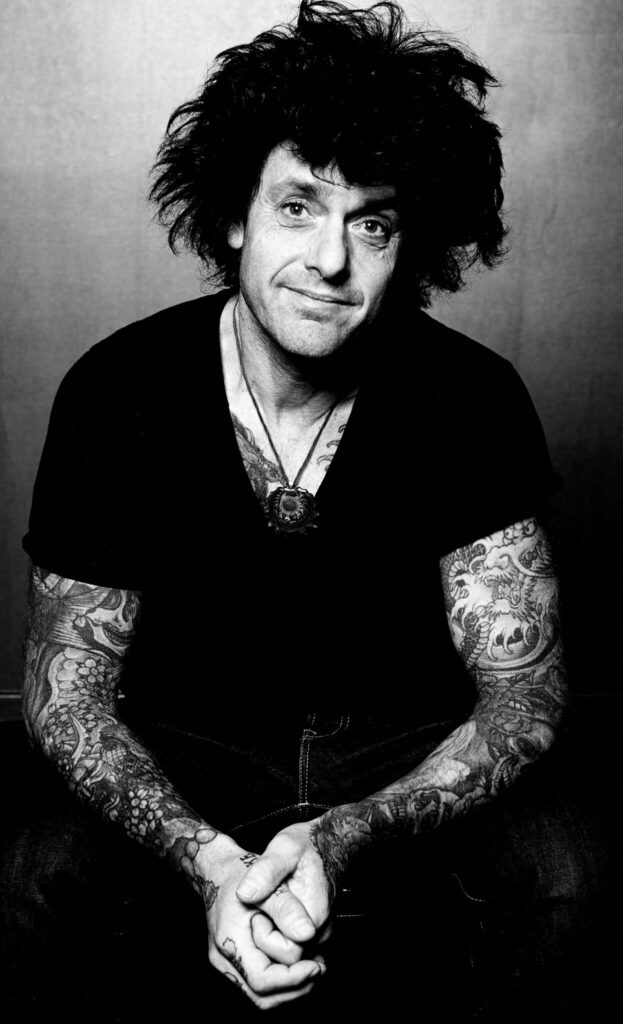
Favorite film?
No Country for Old Men
Favorite musician?
Grateful Dead, Jerry Garcia
Favorite food?
A burger, medium rare
How would you yourself in three words or less?
Empathetic, a hot head
What is your definition of intimacy?
Love

